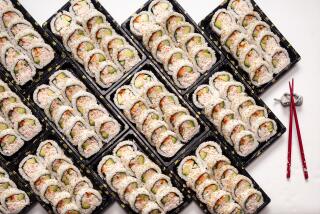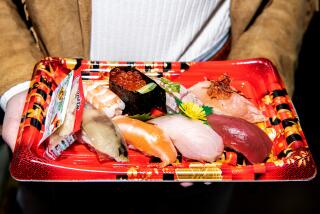Big Seafood Business Helps Keep the Rev. Moon Afloat
- Share via
CHICAGO — Sushi lovers probably don’t think twice about dropping big bucks on a raw-fish dinner out.
But as they tear into a buttery slice of tuna or munch on a morsel of eel in many restaurants, they’re supporting a surprising source: the Unification Church.
When five members of the church arrived in Chicago in 1980 to open a little fish shop on Elston Avenue, people of their faith were castigated as “Moonies” and cult members. They were led by the vision of the Rev. Sun Myung Moon, the self-proclaimed messiah who sustained their spirits as they played their parts in fulfilling the global business plan he had devised.
Moon founded his controversial Unification Church six decades ago with the proclamation that he was asked by Jesus to save humanity. But in building the empire, he blended his conservative politics, savvy capitalism and flair for spectacles such as mass weddings in Madison Square Garden.
In a remarkable story that has gone largely untold, Moon and his followers reaped millions of dollars by dominating one of America’s trendiest indulgences: sushi.
Today, one of those five Elston Avenue pioneers, Takeshi Yashiro, serves as a top executive of a sprawling conglomerate that supplies much of the raw fish Americans eat. The Moon followers’ seafood operation is driven by a commercial powerhouse, known as True World Group. It builds fleets of boats, runs dozens of distribution centers -- including in Los Angeles and San Francisco -- and supplies most of the nation’s 9,000 sushi restaurants.
Over the last three decades, as Moon has faced down accusations of brainwashing followers and personally profiting from the church, he and sushi have made similar journeys from the fringes of American society to the mainstream.
“I have the entire system worked out, starting with boat building,” Moon said in “The Way of Tuna,” a speech given in 1980. “After we build the boats, we catch the fish and process them for the market, and then have a distribution network. This is not just on the drawing board; I have already done it.”
The businesses now employ hundreds, including nonchurch members, from the frigid waters of the Alaskan coast to the iconic American fishing town of Gloucester, Mass.
In a recent interview, the Rev. Phillip Schanker, a Unification Church vice president, said the seafood businesses were “not organizationally or legally connected” to Moon’s church but were simply “businesses founded by members of the Unification Church.” Schanker compared the relationship to successful business owners -- such as J. Willard “Bill” Marriott, a prominent Mormon who founded the hotel chain that bears his name -- who donate money to their churches.
But links between Moon’s religious organization and the fish businesses are spelled out in court and government records as well as in statements by Moon and top church officials.
Moon’s Unification Church is organized under a tax-exempt nonprofit entity called the Holy Spirit Assn. for the Unification of World Christianity. The businesses are controlled by a separate nonprofit company called Unification Church International Inc., or UCI.
That company’s connections to the Unification Church go deeper than the shared name. A 1978 congressional investigation into Moon’s businesses concluded: “It was unclear whether the UCI had any independent functions other than serving as a financial clearinghouse for various Moon organization subsidiaries and projects.”
UCI as well as its subsidiaries and affiliates such as True World are run largely by church members, Schanker said. A portion of True World’s profit makes its way to the church through the layers of parent corporations, Yashiro said, adding, “We live to serve others, and this is how we serve by building a strong business.”
Moon predicted in 1974 that the fishing business would “lay a foundation for the future economy of the Unification Church.” In fact, while Moon and businesses affiliated with him reportedly have poured millions of dollars into money-losing ventures including the Washington Times newspaper, the seafood ventures have created a profit-making infrastructure that could last -- and help support the church -- long after the 86-year-old Moon is gone.
Much of the foundation for that success has its roots in Chicago. True World Foods now operates from a 30,000-square-foot complex in the Elk Grove Village suburb.
The company says it supplies hundreds of local sushi and fine-dining establishments. Even many who might have religious reservations about buying from the company do so for one simple reason: It dependably delivers high-quality sushi.
“We try not to think of the religion part,” said Haruko Imamura, who with her husband runs Katsu on West Peterson Avenue. “We don’t agree with their religion, but it’s nothing to do with the business.”
Some of the business start-up funds came from the Unification Church. From October 1976 to May 1977, Moon signed some of the nearly $1 million in checks used to establish the fishing business, according to the congressional report on allegations of improprieties by Moon’s church.
The businesses have thrived. Company executives say True World Foods, the wholesale distribution arm, had revenue of $250 million last year. According to True World, its 230 refrigerated trucks deliver raw fish to 7,000 sushi and other restaurants nationwide.
One of True World’s advantages is that its sales force speaks Chinese, Korean and Japanese, making it easy to do business with first-generation ethnic restaurateurs.
“It’s kind of tough to compete in this industry with a company that is so global, has a major presence in almost every market and that is driven by religious fervor,” said Bill Dugan, a merchant in the fish business for almost 30 years. “We should all be so blessed.”
More to Read
Inside the business of entertainment
The Wide Shot brings you news, analysis and insights on everything from streaming wars to production — and what it all means for the future.
You may occasionally receive promotional content from the Los Angeles Times.










